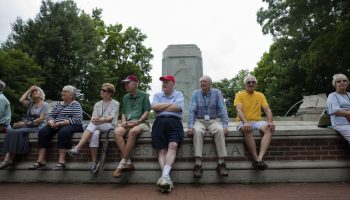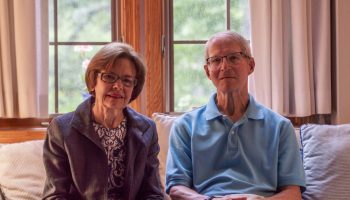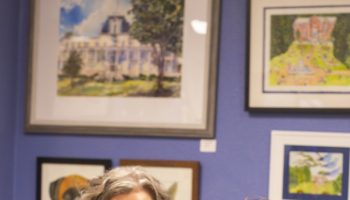Last Saturday morning, Cathy Nowosielski and Jeff Lutz, co-chairs of the Chautauqua Fund, welcomed volunteers in the Athenaeum Hotel Parlor to discuss the future of the Chautauqua Fund.
The Rev. Robert M. Franklin Jr., director of religion, began the Kick-Off Celebration with a prayer.
“We stand now in the sunlight of great opportunities, to enlighten and serve and delight the world that is concerned, anxious and hungry,” Franklin said. “We believe that music and knowledge, inspiration and fun can heal the wounded soul.”
After the prayer, Lutz remarked on an “interesting year,” one with many new beginnings: new leadership, a new Amphitheater and a new experience for him and Nowosielski.
“This is my and Cathy’s third year as co-chairs of the Chautauqua Fund, and this is the first time we’ve ever started the season without a major controversy,” he said.
Lutz covered some of the benchmarks the fund met in 2016. The number of donors increased by almost 6 percent, he said, and donor retention is the strongest it’s been since 2011. He also discussed this year’s target for the annual fund, which is $4 million.
“It’s a significant challenge in front of us, but we don’t do this because it’s easy,” Lutz said.
Geof Follansbee, vice president of development and CEO of the Chautauqua Foundation, started the presentations from Institution leadership. He said fundraising is a tough job, one that requires openness and listening to the needs of others.
Follansbee also discussed the completion of the Promise Campaign. He said the Amp project took up a lot of focus of the campaign, but people shouldn’t lose sight of the other opportunities it funded: endowment for scholarships and inter-arts collaborations such as Romeo & Juliet, Go West! and Carmina Burana, among many other programmatic and environmental initiatives.
John Shedd, director of operations and administrator of architectural and land use regulations, discussed the completion of the Amp project. Shedd got a standing ovation after being introduced by Lutz.
“Thanks again, to all of you,” Shedd said. “I’m lucky enough to get the applause, but you all did this — it was not just one person. Everything we do here is because of what you are able to help us with.”
Shedd discussed the new Amp, a “$41.5 million endeavor.”
“It’s one of those places where we’ll send people in the event of a tornado, instead of saying, ‘Get out!’ ” Shedd said, getting a lot of laughs.
Shedd also mentioned plans for the future of the grounds, including increased accessibility and new, uniform signage to help people navigate.
Betsy Burgeson, supervisor of gardens and landscapes, talked about her work on the grounds as well. She asked volunteers to help encourage donations that will maintain the gardens and landscaping.
“It’s amazing to go see brand new gardens when they’re first installed, and then see how much they’ve already grown in just one year,” Burgeson said. “The same thing can be said with the Promise Campaign and the Chautauqua Fund. The seeds that you plant this year grow into amazing, beautiful things in the years to come.”
After Shedd’s and Burgeson’s remarks, season programming highlights were offered.
Franklin, in his last season as director of religion, said he and his wife are looking forward to “consuming Chautauqua rather than producing it.” He emphasized the dialogue between faiths that he and Maureen Rovegno, associate director of religion, have tried to create with the religious programming this season.
“I think it really is important to model the art of conversation, and Maureen and I have taken that very seriously for the coming season,” Franklin said.
Deborah Sunya Moore, vice president and director of programming, spoke next, thanking the volunteers for their efforts to help Chautauqua expand to the surrounding region and nationwide. She said Tina Downey, director of the Chautauqua Fund, asked her to talk about five things she was excited about from this season’s programming.
“I said, ‘Just five things?’ ” Moore said. “And Tina said, ‘In five minutes.’ So the gauntlet is down, and we’ll see how we do.”
Moore’s list included dance on Bestor Plaza after morning lectures, opera Afternoons of Song on Fridays, the “Mango Suite” inter-arts collaboration, the Logan Chamber Series on Mondays and “Conversations in Red,” which is part of the visual arts programming.
After Moore’s remarks, Lutz introduced Sherra Babcock, vice president and Emily and Richard Smucker Chair for Education. As with Franklin, this is Babcock’s last season in her role.
“It seems like we’ve had three or four announcements of the people that it’s going to take to replace Sherra,” Lutz said. “You know you’re valuable when it takes at least three or four people to replace you.”
Babcock pointed out some of the events she’s excited for this season, such as master classes from the morning lecture speakers, the Chautauqua Prize dinner and presentation for Peter Ho Davies, and the Chautauqua Food Festival in Week Nine, which she said is “a good opportunity to eat.”
As the event wrapped up, Downey offered her thanks to the volunteers, emphasizing their commitment.
“I am just so humbled by your dedication and the amount of hours you put into this,” Downey said. “All of this innovation, creativity and meaningful dialogue and conversation — it’s made possible by you.”
President Michael E. Hill gave the closing remarks. He said the upcoming nine weeks are about finding new ways to reach out and reconnect with each other, an idea that’s “embedded in what the Institution does.”
“You all make that grand experiment possible,” Hill said.
Anyone interested in serving as a volunteer for the Chautauqua Fund is invited to contact Leah Stow, assistant director, at lstow@ciweb.org or 716-357-6405. For more information or to make a gift, visit giving.chq.org.





